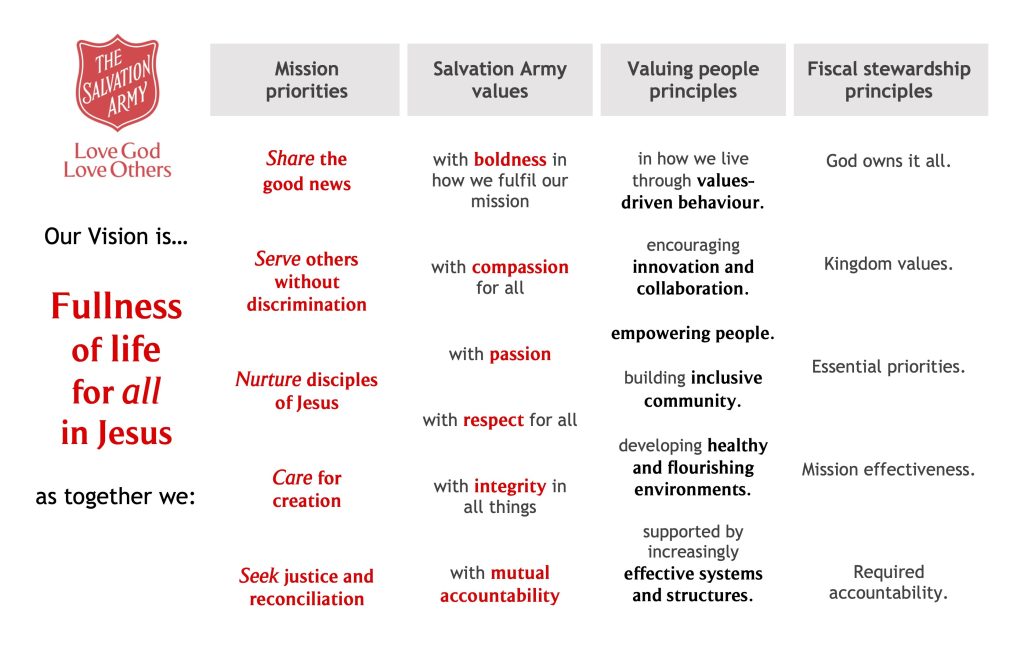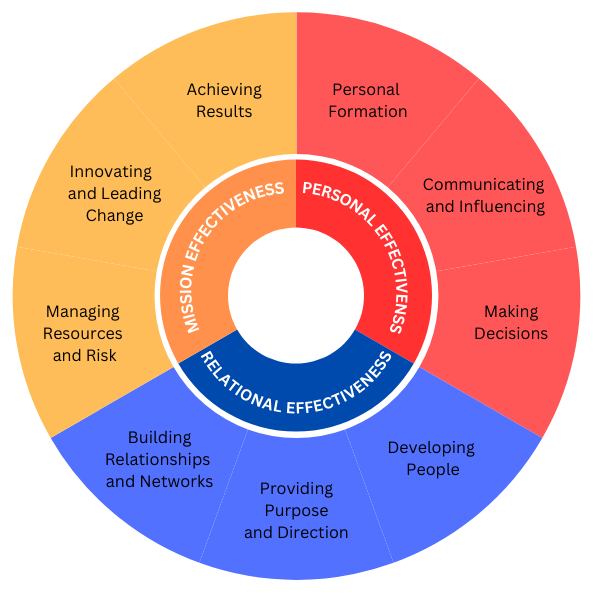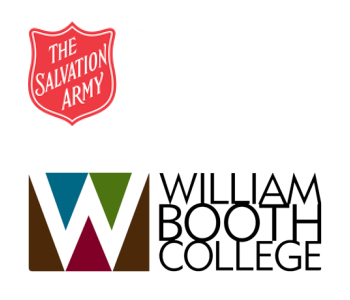Introducing the Manager and Leader Framework
Why this framework?
This framework is presented as part of a leader development strategy, building on the Vocational Development Pathway.
In The Salvation Army we lead and manage in many ways. Perhaps you manage or lead a team? Maybe you have very few or no direct reports, but are responsible for delivering complex projects or programmes or are a thought leader in your field? Whatever your role, this leadership framework is offered, which describes The Salvation Army way of leading we want to aspire to and supports the broadening and deepening of our servant leadership.
The framework aims to support engagement of individuals and teams in their own development, along with access to appropriate resources.
Where has this come from?
In response to leadership concerns for the future, the brief from senior leadership was to ‘develop a robust framework for officer and employed spiritual leader development to underpin every aspect of The Salvation Army mission throughout the UKI Territory’, through’ vocational and leadership development, succession planning, performance management and mutual accountability’. This is to support the flourishing and fruitfulness of people and mission, contributing to building a Kingdom culture.
How does it fit in with The Salvation Army identity and priorities?

Our identity work: vision, mission, values including the valuing people framework and fiscal stewardship principles underpin the framework and are woven throughout.
How does our identity inform how we lead?
We need to continually be drawn back to understand how we live and work together and demonstrate love in action through servant leadership.
It would be obvious for a church to use servant leadership, as Jesus modelled servant leadership through his whole ministry. Servant leadership is a model also used in the business world, commonplace in many organisations and is something we are challenged to fulfil.
Robert K Greenleaf, in his book ‘Servant Leadership: Journey into the Nature of Legitimate Power and Greatness’ suggests a great leader is seen as a servant first, expanding this as an essential principle in secular leadership, and not solely the prerogative of spiritual leadership.
The servant leader recognises that all people have gifts and talents to be developed and used, becoming enabler, equipper and mobiliser of the ministry of others for service.
Servant leaders discover power by giving it up, refuse to use their positions to control people or to use them as steppingstones, enhancing their power by sharing it with others. Leaders must take their authority seriously, exercise it responsibly and not be intoxicated by it, understanding that the power entrusted to them is the power to empower others. The Army will continue to nurture servanthood.
How does this framework help us consider our whole selves in life and work?
The framework is structured in three themes with three sub-themes each with three competencies (see the full table):
- PERSONAL EFFECTIVENESS
Personal Formation
Communicating and Influencing
Making Decisions - RELATIONAL EFECTIVENESS
Developing People
Providing Purpose and Direction
Building Relationships and Networks - MISSION EFFECTIVENESS
Managing Resources and Risk
Innovating and Leading Change
Achieving Results

Each of the competencies has four standards designed to help us measure where we are and where we can develop and mature in this competency:
Emerging Leader
The ‘Emerging’ standard indicates a foundational level of development and understanding. Individuals at this stage are beginning to explore and practice essential skills and behaviors, showing an awareness of key concepts and demonstrating a willingness to engage in personal growth. This stage is characterized by initial efforts and learning, requiring support and guidance.
More detail
Competent Leader
The ‘Competent’ standard signifies a proficient level of ability and consistency in applying skills and knowledge. Individuals at this level effectively balance various aspects of their roles, such as personal and professional responsibilities. They demonstrate confidence and a deeper understanding of practices and principles, working independently and applying their learning in practical contexts.
More detail
Releasing Leader
The ‘Releasing’ standard represents a more advanced level of leadership and influence. Individuals at this stage not only demonstrate competence but also actively foster growth in others. They create environments that encourage trust, creativity, and collaboration. Releasing leaders model best practices, mentor others, and facilitate opportunities for leaning and development. They are proactive in addressing challenges and supporting the wider community.
More detail
Transforming Leader
The ‘Transforming’ standard indicates a highly developed and impactful level of leadership and influence. Individuals at this stage champion significant cultural change in their context. They inspire and guide others through transformative processes, promoting continuous improvement and innovation. Transforming leaders exhibit a profound understanding of their purpose and values, shaping strategic direction and fostering environments of mutual accountability.
More detail
In this stage the person’s life and development from all the previous stages has resulted in a leader in whom wisdom, spiritual authority and great capabilities are evident as the person models flourishing leadership at its best. This person thinks strategically, has a clear vision to move towards and is able to cast that vision in a way that others are inspired and enthused to own it, and is able to set a culture in which other people are able to flourish. In this stage the person is able to bring about transformational change, is comfortable with ambiguity, manages chaos and order and lives and fosters interdependence. In terms of their use of power they act in the service of others, their self takes second place, and they are all about empowering others.
Releasing Leader
The ‘Releasing’ standard represents a more advanced level of leadership and influence. Individuals at this stage not only demonstrate competence but also actively foster growth in others. They create environments that encourage trust, creativity, and collaboration. Releasing leaders model best practices, mentor others, and facilitate opportunities for leaning and development. They are proactive in addressing challenges and supporting the wider community.
These definitions encapsulate the progressive nature of development and leadership within the context of ministry and leadership competencies, providing clear benchmarks for growth and assessment. The standards are not role based. The purpose of standards is to show maturing.
How does the framework help us consider our whole selves in life and work?
‘Knowing, being, doing’ is a framework to support Salvation Army leaders by encouraging us to engage in reflecting holistically on our life. You might have heard this referred to as ‘heart, head, hands’, or as ‘knowledge, skills, behaviour/attitude’, in other contexts.
Knowing – relates to academic learning, includes our experiences, knowledge and understanding of the world in which we live, our understanding of people, and what we believe and why we believe it.
Being – focuses on values, behaviours and attitudes, as well as self-reflection on our character and who we have the potential to become.
Doing – results in our ‘way of being in the world’. What should we do? How should we act? What choices do we make? How do we practically apply expertise?
All three areas are important for mature leadership and are important for The Salvation Army. In understanding and reflecting on the interrelationship between them we can ensure our life is holistic, grounded, and dynamic. Each element influences the other two and our lives are diminished when they are not blended. We need to habitually make deliberate connections between who we are, what we know, how we live and what we do. We believe who we are is the root of our action, but reflection on action can challenge and shape who we are and how we act.
How is reflective practice key in helping us consider our knowing, being and doing?
Reflective practice is the habit of intentionally reflecting on the way one lives and works, reviewing what has been done and exploring possibilities for improvement in one’s practice.
The development framework is built on the concept of reflective practice with an aim to provide a supportive environment and regular opportunities to pause, look back, reflect on practice and experience to notice, learn, grow and deepen our understanding and practice, to equip us as we look ahead. This includes our personal reflection and listening to and reflecting on feedback from others, keeping us accountable, open to other perspectives and enabling us to be adaptable leaders. This all informs our planning for learning and decision making and supports us to better prepare for the future as leaders.
How does the framework fit with the Valuing Individual Performance process?
The framework is laid out in an easy to reference way. It offers definitions of standards of leadership to clarify expectations, help us to see where we are on our leadership journey, offering objective ways to measure our leadership, helping us to identify where and how we can be more effective. This will help us work towards healthy and flourishing environments and flourishing mission.
The framework can inform, support and supplement all elements of the VIP process, including:
- Probationary reviews
- 1-2-1 appraisals
- Annual reviews
- Talent management and succession planning
What is the link between the VIP and day to day leadership?
VIP processes support the requirement for everyone to be receiving regular performance reviews and feedback, identification of learning and development needs, resource for mission and wellbeing, encouragement to engage with mentoring or coaching as appropriate, in a disciplined, timely and meaningful way that is mutually accountable.
Support, Oversight and Release (SOaR) indicates how Salvation Army people need to be appropriately supported and accountable for our work and empowered and released to carry it out. Where people are flourishing, local mission will be flourishing.

